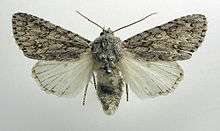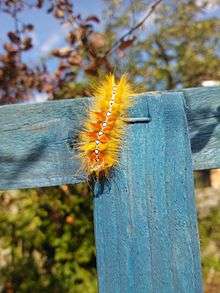Sycamore (moth)
| The Sycamore | |
|---|---|
 | |
 | |
| Scientific classification | |
| Kingdom: | Animalia |
| Phylum: | Arthropoda |
| Class: | Insecta |
| Order: | Lepidoptera |
| Family: | Noctuidae |
| Genus: | Acronicta |
| Species: | A. aceris |
| Binomial name | |
| Acronicta aceris (Linnaeus, 1758) | |


The sycamore (Acronicta aceris) is a moth of the family Noctuidae. It is distributed through most of Europe, from central England south to Morocco. To the east it is found from the Near East and Middle East to West Asia.
The forewings of this species are pale to dark grey with rather indistinct markings apart from a thin black basal streak. The hindwings are white, sometimes with dark streaks at the margin. The wingspan is 40–45 mm. The adults fly at night from June to August and are attracted to light and sugar.
The extraordinary larva is very distinctive, thickly covered with very long yellow and orange hairs with white spots outlined in black along the back. It feeds on various maples and also on common horse-chestnut, large-leaved lime, mulberry and pedunculate oak. The species overwinters as a pupa. Contrary to its bright colours, it is not poisonous, but may cause skin irritation if handled excessively.[1]
- ^ The flight season refers to the British Isles. This may vary in other parts of the range.
Subspecies
References
- Chinery, Michael Collins Guide to the Insects of Britain and Western Europe 1986 (Reprinted 1991)
- Skinner, Bernard Colour Identification Guide to Moths of the British Isles 1984
References: